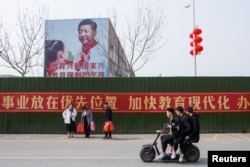Reports from China say arrests of foreign teachers across the country are up sharply this year. That information comes from lawyers, schools and teachers. They also report a jump in foreign teachers forced to leave the country. Chinese deportations of foreign teachers have increased this year.
The lawyers, schools and teachers say the arrests and deportations are part of a larger campaign. They say it combines new police measures with the government’s push for a “cleaner,” more patriotic education system.
Four law offices say requests for representation involving foreign teachers rose in the past six months by between four and 10 times the normal number. The four spoke with the Reuters news agency.
Teachers and school officials confirmed that arrests and temporary detentions for minor crimes had become more common.
Switzerland-based Education First (EF) operates 300 schools in 50 cities across China. EF reportedly has noted a "significant" increase in detentions in China for suspected crimes, including drugs, fighting and cybersecurity violations. This claim comes from a June 27 notice sent to employees and seen by Reuters.
The notice said that EF workers had been "picked up by police at their home and work as well as in bars and nightclubs and have been questioned and brought in for drug testing." It added that the school had received warnings from embassies about the rise in arrests.
A spokesperson for EF refused to comment on details of the notices, but said the company values its close ties with Chinese officials.
An international school in Beijing and a teaching agency in Shanghai separately confirmed to Reuters that arrests had risen sharply.
There is a lot of pressure for them to keep things clean, said Peter Pang, a lawyer at the IPO Pang Xingpu Law Firm in Shanghai, which represents foreign teachers.
“It's all part of (President) Xi Jinping's idea to make sure that China can show a good face for the rest of the world," he said.
Reuters reported last week that Chinese government agencies failed to answer its requests for comment.
China had about 400,000 foreign citizens working in its education industry in 2017, the last year for which official numbers are available. They are employed in schools, colleges and language centers.
Last September, China launched a wide-reaching campaign to remove foreign influences from education. It includes efforts to ban foreign history classes, make self-taught material illegal, and change textbooks to center on Communist Party ideology.
The Chinese effort is designed to support "patriotism" and "core socialist values,” and show a "love for the motherland," the education ministry said at the time.
Many of the cases involving foreign teachers are linked to new and better drug-testing measures, including ones that can find drug use over a longer time. Lawyers said there have been surprise inspections at teacher's homes and workplaces.
Three former teachers from two schools in Beijing and Shanghai were detained for 10 to 30 days before being deported this year. The former teachers said that Chinese officials drug-tested teachers more than once within weeks of arrival and carried out extensive questioning. One of the three said urine tests showed no evidence of drugs, but another test found the drug cannabis in his hair. The teacher, an American, denies using drugs in China.
Hair tests can identify cannabis for up to 90 days. This means that teachers who come from countries where the drug is legal can be arrested and deported even if they do not use the drug in China.
Dan Harris is the Seattle-based managing partner of the law office Harris Bricken. It noted a sharp rise in case requests involving foreign teachers beginning earlier this year.
"What has changed is that many government officials think that kicking out Western influences like English teachers is doing the Party's work, and the schools are taking advantage of it," he said.
Harris now advises foreigners against teaching in China. "The risks of going to China to teach far outweigh the rewards."
I'm Bryan Lynn,
And I’m Anne Ball.
The Reuters News Agency wrote this story. Anne Ball adapted it for Learning English. George Grow was the editor.
Have you taught in China, or do you know someone who has? What do you think of this story? Write to us in the comments section below.
Editor's Note: EF Education First provides Learning English with the Take the VOA English Challenge test.
______________________________________________________________
Words in This Story
patriotic – adj. having or showing great love and support for your country : having or showing patriotism
significant – adj. large enough to be noticed or have an effect
cybersecurity – n. the state of protection against criminal or unauthorized use of electronic data
pick up – v. going somewhere to get a person or thing that you then take to another place
nightclub – n. a place that is open at night, has music, dancing, or a show, and usually serves alcoholic drinks and food
core – n. the central part of something
urine – n. waste liquid that collects in the bladder before leaving the body
kick out – v. to force (someone) to leave a place, group, school
advantage – n. to use (something, such as an opportunity) in a way that helps you : to make good use of (something)
reward – n. money or another kind of payment that is given or received for something that has been done or that is offered for something that might be done











